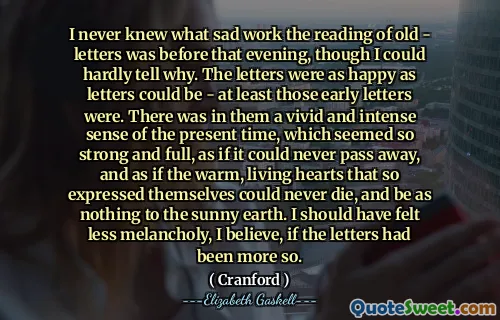
I never knew what sad work the reading of old - letters was before that evening, though I could hardly tell why. The letters were as happy as letters could be - at least those early letters were. There was in them a vivid and intense sense of the present time, which seemed so strong and full, as if it could never pass away, and as if the warm, living hearts that so expressed themselves could never die, and be as nothing to the sunny earth. I should have felt less melancholy, I believe, if the letters had been more so.
This excerpt beautifully captures the bittersweet sentiment often associated with revisiting cherished memories through old letters. The narrator reflects on the paradox of feeling sadness while engaging with joyful communications from the past. It highlights how memories of happiness can evoke a gentle ache—an awareness of their transient nature. The vivid descriptions of the letters embody a profound connection to the present moment, emphasizing how emotionally rich and alive these writings felt at the time. Yet, the recognition that these moments are distant and fleeting brings a nuanced melancholy. Interestingly, the narrator suggests that if the letters had conveyed more sorrow or melancholy themselves, perhaps the feelings of sadness upon reading them would diminish, replacing nostalgia with a different emotion. This contemplation reveals how deeply our perception of the past influences our present emotional state, illustrating the human tendency to cherish joyous memories while simultaneously mourning their passing. Such reflections resonate universally, reminding us that our connections—whether rooted in love, friendship, or shared experiences—are vital to understanding ourselves. They affirm that genuine happiness captured in moments can become a source of both joy and sorrow, emphasizing the delicate balance between memory and mortality. Overall, the passage eloquently explores the enduring power of written words to evoke complex emotions, bridging the gap between the past and present in a richly textured emotional landscape.
(Book: 'Cranford') - Author: 'Elizabeth Gaskell'.






